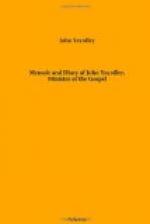In a letter to his sister, Mary Tylor, which he wrote from this place, is the following characteristic sentiment:
Thy welcome letter duly readied me at Nismes, and drew forth my tender sympathy for thee and your whole circle in the loss of a kind and beloved brother. It is another link taken from the family chain, and the shorter it becomes the nearer we are drawn together in the bond of affection. How the spirit seems to ascend with those loved ones who are taken from us, and from earth to heaven! Our desire for a blissful eternity becomes more ardent, because they have already entered upon it; but above all, we desire to be with Him in whom we shall be one, and all will be glory.
Returning to Nismes, he occupied himself with holding meetings in many places in that neighborhood. In some meetings which he attended in the city, he had for fellow-laborers Eli and Sybil Jones, from the United States, with their companions. Amongst the audience at one of these meetings were three soldiers, who, with two others, had been awakened at Lyons, and who manifested the progress they had made in Christian doctrine by refusing to kneel before the procession of the Host. Their officer observing their disregard of this required practice, held his sword over the neck of one of them, saying he would strike off his head if he did not bow down. The man was firm in his refusal, and was sent to prison. To encourage one another in their new profession, these men were accustomed to keep religious meetings. They were in consequence accused of sedition, and when they asserted the simply religions character of their meetings, one of them was required to swear to the truth of his statement; he refused to take an oath, pleading that the New Testament commanded him not to swear. A second was then called upon in the same way; he also refused; and their stedfastness was reported to the commanding officer as an act of contumacy. The officer happened to be a Protestant, of an enlightened and pious disposition; he said that soldiers were called upon to vindicate the innocence of their companions, not to procure their condemnation, and that if they did not choose to give evidence the law would not compel them. Two of the five received their discharge from the army; the rest were removed to Nismes. John Yeardley had some conversation with these three after the meeting, with which he was well satisfied. They told him that when they were awakened they wrote and received so many letters that it excited suspicion, and that the police who examined the letters took the texts of Scripture, or rather the figures that referred to the chapters and verses, for a secret language, used to deceive their vigilance.
On the 8th of the Eleventh Month, J. Yeardley and W. Rasche, accompanied by Jules Paradon, went to Valence, and visited Bertram Combe, at Pialoux, where they remained a few days. B.C. had fitted up a commodious room adjoining his own dwelling, where he held meetings regularly:—




